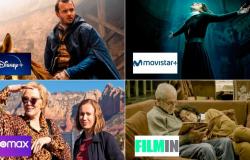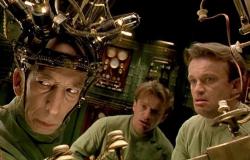On March 9, 1988, two then amateur journalists, Luciano di Vito and Fernando Gonzalezthey managed to gather the members of Seru Giranfor the first time since their separation in 1982. It happened in the Almagro neighborhood and they were present Charly García, David Lebón, Pedro Aznar and Oscar Moro.
This almost secret meeting could be observed as the zero degree of the return of the quartet, which would take place almost five years later, in December 1992. For years and due to the limited circulation it had at the time, this journalistic piece was considered a mixture of urban myth and, at the same time, an impossible object of desire for fans.
Now, that interview appeared in its entirety in the book The impossible interview. An afternoon with Serú Girán March 9, 1988under the Vandemécun label, with introductory texts by its authors, Sergio Leban, Roque Di Pietro and Jorge Bernardez.
Next, Infobae Culture publishes the first part of the dialogue.
[La grabación comienza con Lebón y una historia sobre Héctor Starc, el primer sonidista de Serú Girán]
—Lebón: Héctor’s last one in Corrientes, I come with the van, they stop in the middle of Corrientes where all the cinemas are. He gets off with his sandals and sandals and pulls down his pants and says “David!” In front of everyone, he no longer cared about anything. [risas].
—Di Vito: We have seen that they laugh a lot… How long has it been since they all saw each other together?
—Lebón: See you at different times…
—García: But the four of us never together like this… At the wakes [risas].
—Di Vito: Is it good for you to get together?
—Lebón: Thanks to this proposal it was possible to do… We’ll see each other separately, but it’s great.
—García: The last time we saw each other we played together (1). Then we saw each other separately.
—González: And you never had the idea of getting together again before?
—Aznar: They have given us the vibe, but never a dollar [risas].
—González: No, get together to talk…
—Aznar: It’s just that we charge to talk.
—García: We had some offers, but it didn’t happen… The number of zeros didn’t give [risas]. But we are still in records and cassettes, they are still being manufactured.
—Aznar: We are like Hendrix, the more time we are apart, the more albums we make. It’s like some kind of miracle (2).
—Di Vito: Has a record company ever tempted you to play again?
—García: I don’t know, Pedro, did someone tempt you?
—Di Vito: David, did someone tempt you?
—Lebón: No, no, people always ask you and tell you “I would love for you to get together,” but never a proposal from the company and I don’t think they are going to make it to me. I think Serú was a bit of Flaco’s idea (3), He came looking for me.
—García: Yes, I took you to those beaches and corrupted you! [risas]
—Lebón: Only proposals from friends.
—García: Or blackmail.
—Di Vito: And did you ever think about getting together on your own?
—García: I have had dreams. No, what do I know… In one of those, who tells you…
—González: We will return and we will be armchairs said Louis XV…
—García: Uh, that joke is really bad.
—Lebón: The other day we were talking to Pedro… He sounded great, we got along well, we were very different, but we got along very well.
—Aznar: Not anymore, but it doesn’t matter… Money can overcome everything.
—García: Sometimes when I see videos of Serú on TV, something grabs me… Then I drink a Uvasal and it goes away. [risas].
—Di Vito: How did you come up with the idea of creating Serú?
—García: It started because I wanted to work with David. I would go to his house and try to convince him…
—Lebón: With invoices.
—García: But I realized that it wasn’t with invoices.
—Lebón: The day he went with a bottle of JB he convinced me.
—García: After going back and forth a lot, we decided to go to Brazil. We rented a house in Búzios with our friend Oscar López in the dark years of ’77, ’78. There we waited about two months for the instruments to arrive and once they arrived we began to compose those wonderful songs. Then I had to come here to look for a little money and there we saw that a duo was not a good idea and we thought about a quartet. I spoke to Moro and they recommended Pedro to me. I went to see him play in a pub where this poor boy made a decent living. [risas]. Then David took a van and took the equipment to San Pablo with Billy Bond. And we rented a house in San Pablo, which was very nice by the way. And one night Moro and Pedro arrived.
—González: And you said “we have been waiting for you for centuries.”
—García: We plugged in, marked four and said “This is the wonderful Serú Girán set.”
—Di Vito: Were you, Pedro, working with Alas?
—Aznar: I was doing little jobs, like that, recordings (4).
—Di Vito: What was the first thing you thought when Charly called you? What do you remember?
—Aznar: I didn’t expect it.
—Di Vito: Did you already know Charly?
—Aznar: No (5).
—Di Vito: And you Moro?
—Moro: I knew him [a Charly] before because we had played together, before playing in La Maquina… We already knew each other, there was a relationship (6).
—Di Vito: There is a very famous anecdote, I don’t know which of you told it, about the Kraft Auditorium, that they started playing there…
—García: No, I started playing at ABC (7)Serú started at the Kraft Auditorium.
—Lebón: No!
—García: No, we started in Works, we failed in Works… [risas] We came from Brazil believing that we were more or less, I don’t know, Genesis.
—Moro: It was a very nice thing, but it was very strong at the time.
—García: It was cute. There was an orchestra, Badía and the videos of him… (8) And well, when we played, I don’t know, I don’t think it was liked very much. Lebón sent a couple of jokes… And the criticism destroyed us. Just like that (9).
—Aznar: I liked the comment about the hermaphrodite choirs. “This new group that comes to propose these hermaphrodite choirs” (10).
—García: Well, a pale one. We had to go downstairs, we went with the suitcase to sell the shows and from there we went to the Kraft Auditorium (eleven).
—González: And the first album?
—García: We already had the first album recorded when we came here. We recorded in San Pablo and then I went with that, with those tapes, to the United States, to put on the wonderful orchestra. With the wonderful production of Billy Bond the album was made (12). I don’t remember if the album had come out here [cuando fue el show de Obras]… Ah yes, right, “Seminare” was playing on the radio. Well, we rehearsed a little here and we went to play and the harsh reality hit us, it hit us hard.
—González: And how long did it take them to recover?
—García: A couple of months. One year.
—Aznar: Until 79, Serú Girán was nothing.
Footnotes:
(1) Reference to the spontaneous meeting in Serú Girán that occurred during the celebration for García’s 35th birthday. It was at the Prix D’Ami on Arcos Street in the early morning of October 24, 1986. See: Samalea, Fernando. What is a longplay (Buenos Aires, Sudamericana, 2015) pp. 239-240.
(2) A comment from Pedro in relation to the exponential growth that Hendrix’s post-mortem discography had, especially in the period 1971-1980.
(3) Lebón will refer to García several times as Flaco.
(4) By the time García summoned Pedro AznarBy April or May 1978, Alas had already broken up. At that time, the bassist—who had already joined the legendary first formation of Atomic Mother and recorded on the album Flying from life of Raul Porchetto— played in Pastoral (where he met Oscar Moro and, at that time, he recommended it for Seru Giran) and in the standards group Amalgamof Raul Parentella (where, after the Rosario’s recommendation, García saw him in action).
(5) In case there are any nerds in these pages, it is worth saying that in August 1977 García and Aznar met, perhaps without greeting each other, at the press conference of Joe Cocker at the Alvear Hotel.
(6) Oscar Moro is one of the two drummers who take part in Little anecdotes about the institutionsthe third LP by Sui Generis. It was also part of the album Porsuigieco.
(7) Esmeralda 596, in the Tres Trips cycle, in which he participated Sui Generis.
(8) With “Badía and his videos” Charly means that Juan Alberto Badia He installed cameras and screens belonging to his company Record Vision for the first Obras de Serú Girán in November 1978, a concert that the announcer also produced.
(9) Lebón’s joke was the following: after performing “Disco-shock”, a parody of disco music that was very poorly received by the press and the public, Lebón said “Not when I was little, but now what a whore I am.”
(10) Reference to the note published by Sibila Camps In the diary The opinion (5-XI-1978, back cover).
(eleven) After the failed Obras de November ’78, Serú Girán played at the Teatro Premier on December 7, 8 and 9. In September 1979, they presented The Fat of the Capitals at the Kraft Auditorium (also known as the Buenos Aires Auditorium).
(12) The phrase “wonderful production of Billy Bond” is clearly an irony of García, who complained on several occasions about the actions of Oscar Lopez and Bond during the making of Serú Girán’s first LP.
(Photos: Sergio Lebán – Courtesy Vademecum)






